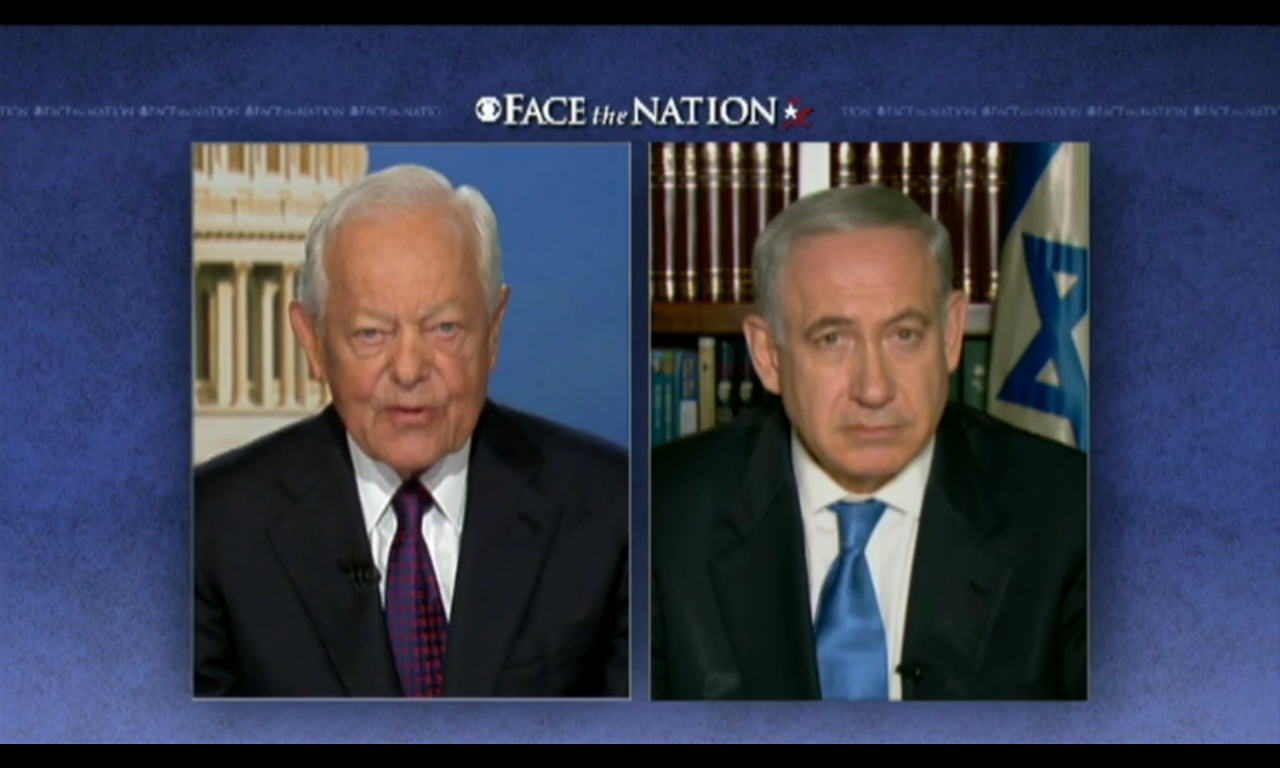by Peter Jenkins
What a pity that Mr. Netanyahu’s interviewer on CBS’s “Face the Nation”, Bob Schieffer, chose to throw Israel’s Prime Minister a succession of softballs (the cricketing equivalents are called “dollies”).
It would have been refreshing if Mr. Schieffer had asked the PM how he squared his certainty about Iran’s nuclear intentions with the assessments that the US intelligence community has produced; queried the PM’s assertion that producing fissile material is nine tenths of the challenge of making a nuclear weapon capable of threatening Israel; reminded the PM of the numerous occasions he has claimed time to be running out for Iran diplomacy; and confronted the PM with what Saudi Prince Turki bin Faisal, a prominent spokesman for an Arab state that has coexisted peacefully with Israel, said to an interviewer from Spiegel last month:
SPIEGEL: What do you think would happen if Israel were to carry out a pre-emptive attack to prevent Tehran from building the bomb?
Prince Turki: Iran would retaliate against everybody — with its missiles, with suicide bombers, with agents. And we would be the first victims. Imagine if a nuclear installation is destroyed in Iran and there is fallout on our side of the border. The Iranian people would coalesce around their government. In short, it would be total mayhem.
An even more interesting question would have been this: “Prime Minister, have developments over the last two years ever prompted you to re-visit the decision taken by one of your predecessors, in 1992, to demonise Iran, in order to preserve the strategic value of Israel to the US?”
I doubt Mr. Schieffer would have got much of an answer. Yet it would be fascinating to know whether Israel is starting to reconsider the premise of the anti-Iranian course on which it embarked 21 years ago, with ever-greater consequences for US attitudes to Iran, especially in Congress.
According to Trita Parsi, the author of Treacherous Alliance: the Secret Dealings of Israel, Iran and the US, that course was premised on a change in the way Israeli leaders viewed their neighbourhood.
Since the time of Ben-Gurion, Israel had sought friendly ties with “the periphery” (Iran and Turkey) in order to counter-balance the threat posed by “the vicinity” (the Arab states surrounding Israel plus Iraq).
In 1992 it dawned on a new Israeli government that the defeat of Iraq in the first Gulf War, the dismantlement of Iraqi WMD programs, Egyptian passivity and the launching of the Madrid peace process had defused the Arab threat and opened up possibilities for Israeli economic penetration of Arab neighbours.
But “Israel would have no future in the new order unless it could find a rationale for Washington to continue the strategic relationship” writes Parsi, who goes on to quote an expert on Israeli foreign policy: “There’s no doubt that when the prospects for peace with the inner circle emerged [the depiction of Iran as a threat] started”.
Iran was the obvious choice because of the torrent of revolutionary, anti-imperialist and anti-Israeli rhetoric that had flowed out of Tehran since 1979, and because Iran might one day seek to rival Israeli influence in the Arab states.
Writes Parsi: “Swiftly a campaign was organised to convince the US and Europe that Iran was a global threat.”
“The charges were based not on an existing Iranian threat but on the anticipation of a future Iranian threat,” he states.
What followed is becoming history.
Now the question is whether Israel still feels as sanguine about its Arab “vicinity”, and whether it continues to want Iran to provide the rationale for its strategic relationship with the US.
One might suppose that Israel could dispense with Iran as a rationale now that the US and Europe have such need of Israel as a still point of democratic stability in a maelstrom of Arab unrest.
Can one also suppose that Israel might see value in encouraging the US and Europe to cooperate with Iran to restore stability to the Arab “vicinity”?
The point is not that Syria, Iraq and Egypt are in any condition to threaten Israel militarily. Of course they are not. The point is that instability is intrinsically unpredictable.
Some future twist in the unfolding drama of the Arab Spring could transform Israel’s strategic prospects. And meanwhile the risk of chemical weapons falling into the hands of anti-Israeli terrorists is greater than it has ever been.
The fiction that Iran is a global threat no longer serves Israel well. How long will it take the Israelis, intelligent as they are, to realise that?






One could consider that the P.M. is approaching desperation in his rant[s] today. After all, he’s been doing the same dance routine for all those years, crying the “sky is falling”, yet it never materializes as he portrays it to be. Perhaps it’s time the men in the white coats use their nets and put him away for his own safety, as well as the rest of the M.E. too. Let’s just hope that the saner minds don’t give in and plunge the world into WW3.
Iran has never been a military threat to Israel, but it has become a competitive economic “threat”, for example in the natural gas producer market. Israel is counting on its offshore EEZ reserves to catapult it into economic independence, but its competitor in this market and the revenues that can be obtained is Iran via the planned Iran, Iraq, Syria natural gas pipeline. It is in Israel’s interest to continue to demonize Iran, and press for tougher sanctions, to prevent Iran from competing with it in the European marketplace.
It is also in Israel’s interest to conflate the threats and instigate a war, to benefit its arms industry.
What has been forgotten is that both Israel and Iran are signatories to a regional development plan that would include a Technion type institute based in Amman, Jordan to serve as a technical incubator. It is that type of cooperation that would benefit both countries the most.
How refreshing to think probing questions could and should be asked, and how charming it would be if answers were given. However, I won’t squander this opportunity to pose questions to the Israeli PM. He seems to be a prawn short of a seafood salad. But, if I may, a question for you, Mr Ambassador:
Have developments over the last years now belatedly prompted the UK to re-visit the decision apparently taken by HM government, and British Media organs for many years now to agitate against Iran since the inexplicable end of the ‘constructive engagement?’
E.g.
-the then British foreign secretary David Miliband telling Persian Gulf states that “Iran is an immediate threat.” Embarrassingly, the host of this conference, UAE, spends more on her military than Iran does, then and now. Please see http://www.thenational.ae/news/uae-news/miliband-iran-immediate-threat
-BBC’s insistence to “render” the (in)famous “wipe off the map” phrase.
http://www.bbc.co.uk/blogs/theeditors/2007/03/wiped_off_the_map.html
-the Guardian’s full-bore, full-time demonisation and mocking of Iran.